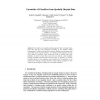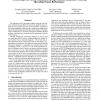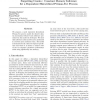1091 search results - page 15 / 219 » Learning Models for Predicting Recognition Performance |
113
click to vote
MCS
2005
Springer
15 years 5 months ago
2005
Springer
We describe an ensemble learning approach that accurately learns from data that has been partitioned according to the arbitrary spatial requirements of a large-scale simulation whe...
105
click to vote
ISPASS
2007
IEEE
15 years 6 months ago
2007
IEEE
The ongoing trend of increasing computer hardware and software complexity has resulted in the increase in complexity and overheads of cycle-accurate processor system simulation, e...
CGO
2008
IEEE
15 years 6 months ago
2008
IEEE
This paper describes an algorithm that takes a trace (i.e., a sequence of numbers or vectors of numbers) as input, and from that produces a sequence of loop nests that, when run, ...
ICAS
2009
IEEE
15 years 6 months ago
2009
IEEE
Abstract—Traditionally, performance has been the most important metrics when evaluating a system. However, in the last decades industry and academia have been paying increasing a...
ICML
2010
IEEE
15 years 22 days ago
2010
IEEE
We propose a novel dependent hierarchical Pitman-Yor process model for discrete data. An incremental Monte Carlo inference procedure for this model is developed. We show that infe...



